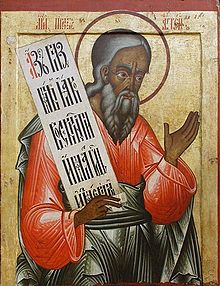- Haggai
-
Haggai (
 /ˈhæɡiˌaɪ/; Hebrew: חַגַּי, Ḥaggay or "Hag-i", Koine Greek: Ἀγγαῖος; Latin: Aggeus) was a Hebrew prophet during the building of the Second Temple in Jerusalem, and one of the twelve minor prophets in the Hebrew Bible and the author of the Book of Haggai. His name means "my holiday". He was the first of three prophets (with Zechariah, his contemporary, and Malachi, who lived about one hundred years later), who belonged to the period of Jewish history which began after the return from captivity in Babylon.
/ˈhæɡiˌaɪ/; Hebrew: חַגַּי, Ḥaggay or "Hag-i", Koine Greek: Ἀγγαῖος; Latin: Aggeus) was a Hebrew prophet during the building of the Second Temple in Jerusalem, and one of the twelve minor prophets in the Hebrew Bible and the author of the Book of Haggai. His name means "my holiday". He was the first of three prophets (with Zechariah, his contemporary, and Malachi, who lived about one hundred years later), who belonged to the period of Jewish history which began after the return from captivity in Babylon.Scarcely anything is known of his personal history. He may have been one of the captives taken to Babylon by Nebuchadnezzar. He began his ministry about sixteen years after the return of the Jews to Judah (ca. 520 BCE). The work of rebuilding the temple had been put to a stop through the intrigues of the Samaritans. After having been suspended for eighteen years, the work was resumed through the efforts of Haggai and Zechariah.[1] They exhorted the people, which roused them from their lethargy, and induced them to take advantage of a change in the policy of the Persian government under Darius the Great.
The name Haggai, with various vocalizations, is also found in the Book of Esther, as a eunuch servant of the Queen.
Contents
Haggai and officials of his time
Haggai was a weak supporter of the officials of his time, specifically Zerubbabel, the governor, and Joshua the High Priest. In the Book of Haggai, God refers to Zerebbabel as "my servant" as King David was, and says he will make him as a "signet ring," as King Jehoiachin was (Haggai 2:23; cf. Jer 22:24). The signet ring symbolized a ring worn on the hand of Yahweh, showing that a king held divine favor. Thus, Haggai is implicitly, but not explicitly, saying that Zerubbabel would preside over a restored Davidic kingdom.[2]
Liturgical commemoration
On the Eastern Orthodox liturgical calendar, Haggai is commemorated as a saint and prophet. His feast day is December 16 (for those churches which follow the traditional Julian Calendar, December 16 currently falls on December 29 of the modern Gregorian Calendar). He is also commemorated, in common with the other righteous persons of the Old Testament, on the Sunday of the Holy Fathers (the Sunday before the Nativity of the Lord).
Haggai is commemorated with the other Minor prophets in the Calendar of saints of the Armenian Apostolic Church on July 31.
See also
- Book of Haggai
- Tomb of the Prophets Haggai, Zechariah and Malachi
References
- This article incorporates text from Easton's Bible Dictionary (1897), a publication now in the public domain.
External links
- Prophet Haggai Orthodox icon and synaxarion
Prophets in the Hebrew Bible Pre-Patriarchs (Bible) Patriarchs and Matriarchs Israelite prophets
in the TorahProphets mentioned
in the Former ProphetsMajor Prophets Minor Prophets Noahide prophets Other prophets Italics denote that the status as a prophet is not universally accepted. · rl are articles dealing with the prophet within Rabbinic Literature.Categories:- Prophets of the Hebrew Bible
- 6th-century BC writers
- Old Testament saints
Wikimedia Foundation. 2010.

